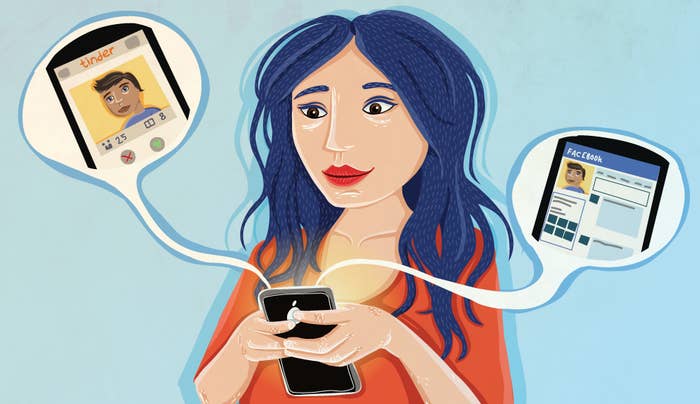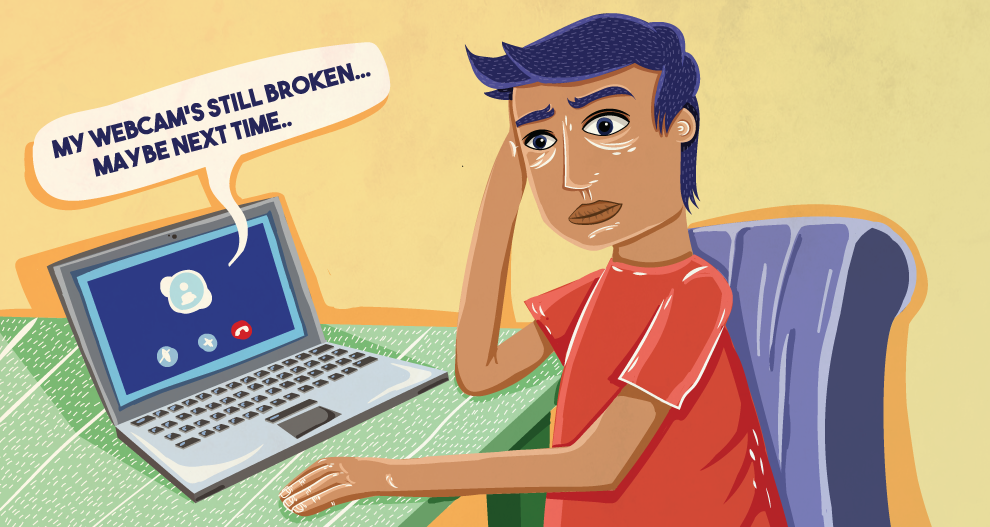
In May, BuzzFeed News published the story of Leah Palmer, detailing an elaborate three-year hoax in which someone stole pictures and fabricated an entire alter ego. It was an extreme case of catfishing: "Leah" convinced several people she was real, including a man with whom she conducted an online long-distance relationship.
What is it drives people to do this? BuzzFeed News has spoken to experts in cyberpsychology to find out why – and it turns out it's got a lot to do with how the internet is changing our brains.
In the weeks following the Leah Palmer story, we were inundated with similar tales from all over the world from people who had been affected by online identity theft.
There was Allyssa Griffiths, a fashion blogger from Ohio, whose online stalker stole her pictures, status updates and even her friends' pictures and stories for five years (she wrote about her experience here).
There was Kevin, from New York, who began chatting to an attractive woman called Alex online on a daily basis, and sometimes on the phone. He ended up meeting other men who'd also been duped by her, and together they discovered that the real person behind Alexa was in Kevin's marketing class at college. (In a surreal twist, Kevin got talking to the catfisher and she introduced him to a friend whom he went on several dates with – also, Kevin named his company Alexa Inc).
We heard from Toffer, from Houston, Texas, who found out that someone he used to chat to online in the 1990s had created a MySpace account for a nonexistent boyfriend using his images.
We spoke to Carla, from Glasgow, who got talking to a man online who claimed to be a singer-songwriter. They chatted for a long time and she was impressed – but then one night at a gig, she heard one of the "new songs" he'd recently sent her performed by another singer. The singer at the gig was an up-and-coming artist; the online pretender was simply a fraudster.
She told him via text: "If you don't phone me right now, I'll never speak to you ever again." So he rang, Carla picked up the phone, and there was "just silence and some kind of muffled sniffling", she says. Carla writes a blog about her experience.
It's not just adults whose pictures are stolen to create a fake identity – it's children too.
Máiréad, from Ireland, told us that six or seven years ago someone posted a link to a tribute site on an online forum she regularly visited that told of 14-year-old French twins who had been tragically murdered on the same day – but it later transpired that they were alive and well.
"Later posts suggested that it was murder-suicide," she says. "This naturally drew out lots of sympathy, including from mothers who lost their children very young also."
The woman who posted the link left clues that something was up, and later on, the twins found out about the whole thing and were appalled. "They reacted badly, as you can imagine," says Máiréad. "However creepy it is to live vicariously through someone else's online presence, dying though them is a hell of a lot stranger!"
And then there were the babies.
Ali Hainkel, from Louisiana, says a faker found her way into a private BabyCenter group used by mums to share parenting stories and advice and falsely claimed she had two children.
"What our troll did – her fake name was Kitty – was find an active and public Flickr account that a woman used to store the photos of her two children from birth onwards," Hainkel says. "She saved all the pictures and videos and began her story about two years earlier so she could share everything on her schedule and have it all planned out.
"Her story covered at least one child's birth and every noteworthy life event and celebration you could imagine. It was incredibly detailed."

So what motivates people to fake it online? It's to do with online media making us present different versions of ourselves.
One thing that tends to be said about the people behind fake online personalities is that the perpetrator must be somehow "damaged" or mentally ill. But according to psychologists, it's not that simple – there are lots of reasons someone might feel the need to be someone else on the internet.
Dr Chris Fullwood, a cyberpsychologist at the University of Wolverhampton, told BuzzFeed News that by creating a false identity, some people are trying to narrow the gap between their imagined ideal self and how they actually see themselves.
And in an era in which young people are obsessed with taking selfies, we have an increasingly fluid concept of our own identity.
"The contemporary notion of self is that we don't have a single stable self," he says. "We have different selves that relate to different environments and different individuals. In the online world these boundaries become more difficult to navigate."
So for a generation who have a slightly tweaked version of their personality for different platforms and situations – Facebook, Instagram, Twitter, private WhatsApp groups, Snapchat, text messages, real-life interactions – perhaps it's understandable that people make the leap to making significant changes to their persona, or even inventing new ones.
"[On Facebook] you create one profile and then everybody in your network sees you," Fullwood says. "But if I went to dinner with my friends or my parents I might act in a different way to reflect those different relationships. On Facebook I can't do that. I have to present a single unitary self, and that can create all sorts of problems."
Those "problems" might mean someone seeking to be something they're not to escape the shackles of their normal, ordinary self.
Catfishing is an extension of stalking, which is increasingly becoming normalised online.
One study found that 88% of people spy on their exes on social media after a break-up through looking at their pictures and status updates, sometimes via a mutual friend.
As Dr Emma Short, a psychologist at the University of Bedfordshire, told BuzzFeed News, this behaviour is increasingly normalised these days – it's sometimes referred to as "creeping". But previous generations would have been shocked that it's possible to covertly spy on other lives.
"In years gone by that kind of behaviour would have been called surveillance or stalking," Short says. "People joke about having stalkers on Facebook but it is actually the same behaviour. It's about a fixation that stops you moving through life. I'm not saying it's always a bad thing, it's just something you observe.
"You lose no social currency though it because no one sees it – you don't have to account for your behaviour."
In many catfishing cases, the person running the fake account spends a lot of time before and during the hoax observing the real account they're stealing from – and nobody knows.
Another reasons people catfish is because they can: Anyone can find and download pictures from Facebook, Instagram, or anywhere else, in seconds. The Facebook generation is the first to be able to create a believable fake identity in the time it takes to make a cup of tea.
But why then do people fall for it time after time?
Our Leah Palmer piece reported how a man left his girlfriend for a women who didn't exist. A popular response in the comments underneath was, "How didn't he know?"
But there are real reasons why we choose to see what we wantto see when it comes to meeting people online.
"If someone presents to us an intact, detailed identity, we immediately trust it," says Short. "That's because if we recognise just the outline of the individual – online or in the real world – we assume that that is real, with no verification. So identity equals trust, even if it's not real. If someone looks like a person, we think they are a person."
She explains that it got a lot to do with instinct: "It's partially an evolutionary default. We're social creatures, that's just what we do: We see a pattern that looks like an individual and we think it must be a real person."
Unconscious social cues tell us what we want to know about someone depending on what we want, says Short. So if we're looking for a friend, colleague, or a lover, we're predisposed to find people who fit the bill.
Even if there are details missing or there's something suspicious – for example, someone's webcam is always broken, or their career seems sketchy – human brains are happy to fill in the blanks.
"Just as we stereotype people in the physical world and immediately make judgments, I think the same thing is happening online," Short says. "We look at profiles and fill in the gaps – you do the dot-to-dot and make all sorts of assumptions about who this person is.
"This is happening very, very fast and we're not switched on to the fact that verification is very poor [online]. In the physical world, people lie but at least you know it's them in front of you. You just don't know that in an online relationship."
